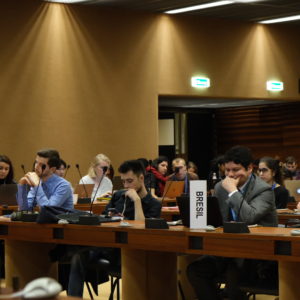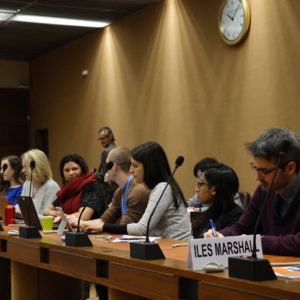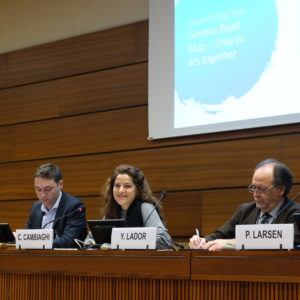Event Conference
HRC43 Side Event | The Environmental Human Rights Defenders Crisis | Towards a Geneva Road Map
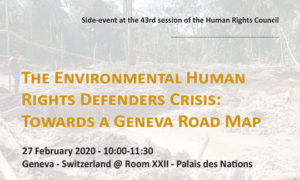
27 Feb 2020
10:00–11:30
Venue: Palais des Nations | Room XXII
Organization: Geneva Environment Network
As demonstrated in several reports, including those of the Special Rapporteur on Human Rights Defenders, individuals acting to protect the environment increasingly face heightened risks and suffer grave violations of their rights as a result of their defense of environment, land and indigenous rights. They are subjected to harassment, threats, intimidation, stigma, criminalization, detention and even killings from both State and non-State actors.
About this Session
A wide range of civil society and multilateral efforts are emerging to protect those engaged in defending our environment. On 21 March 2019, the Human Rights Council adopted Resolution 40/11 recognizing the contribution of environmental human rights defenders and the obligations of States to respect their fundamental rights.
As follow-up, a Road map is being launched by networks and organizations in 2020 to strengthen its implementation. Its preparation includes an expert meeting to help articulate and put forward possible steps of action for the research, environmental and human rights communities to feed into Human Rights processes as well as Environmental ones such as the IUCN World Conservation Congress in June 2020 in Marseille.
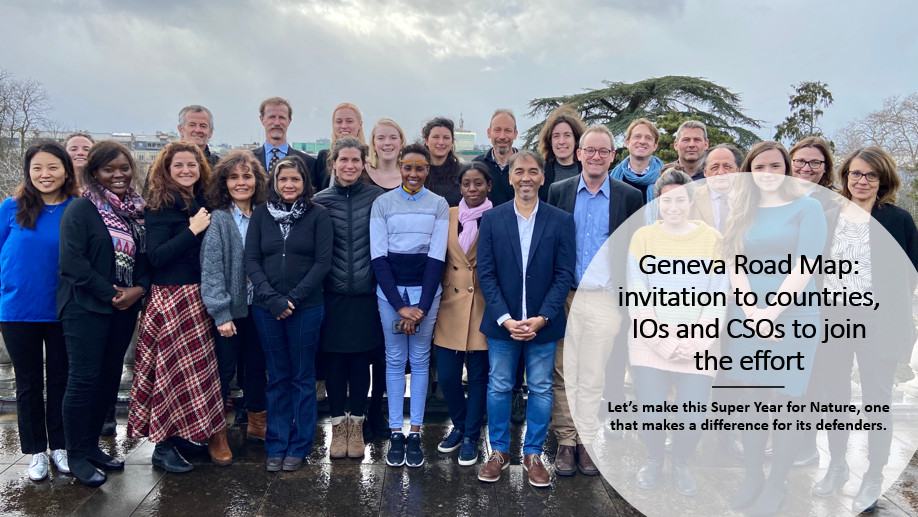
Environmental Human Rights Defenders Workshop at Palais Eynard
This Side-event explored how to mobilize the international community from both the human rights and the conservation fields to respond to the on-going crisis and join forces towards the implementation of Resolution 40/11. How to strengthen the effective implementation of the right to act for the protection of the environment and to promote free and safe spaces for information and discussion on environmental matters?
With the support of Switzerland and Fiji, and with the participation of environmental defenders, NGOs and academic partners, the event aimed to strengthen the dialogue process to help shape key building blocks for a Geneva Road map aiming at the implementation of Resolution 40/11, review progress made and discuss about needs and perspectives.
Diplomatic missions and the wider UN community were cordially invited to join the event and help shape the building blocks for the Geneva Road map.
How can the international community improve its responses?
Agenda
Opening Remarks
H.E. Amb. Nazhat Shameem KHAN, Permanent Mission of Fiji to the UN in Geneva
Barbara FONTANA, Permanent Mission of Switzerland to the UN in Geneva
Michel FORST, UN Special Rapporteur on the situation of human rights defenders
Understanding the crisis
Moderation: Peter LARSEN, University of Geneva
Claudelice SANTOS, Zé Claudio and Maria Foundation
Selen Selen CATALYUEKLI, Defender
Enteng BAUTISTA, Kalikasan People’s Network, Philippines
José AYLWIN, Observatorio Ciudadano
Mary MENTON, University of Sussex
Launching the Road Map
Cristina CAMBIAGHI, International Land Coalition
Louis MASON, Universal Rights Group (URG)
Yves LADOR, Earthjustice
Summary
Opening
H.E. Amb. Nazhat Shameem Khan, Permanent Mission of Fiji to the UN in Geneva
- Difficult to translate hope in achievements in the fight against climate change into action
- Risks:
- symbiotic relationship between businesses and governments
- development entails the risk that the environment is neglected
- corruption
- The people protect the environment because it works for them
- How to empower a community to negotiate with the government and businesses?
- Businesses and international companies are not always aware of Human Rights
- Intimidation, aggression, reprisal can be very effective from excluding environmental defenders from the negotiations’ table
- How to translate HRC resolutions or constitutional guarantees of a right to a healthy environment into practice
- Prevention agenda: capacity to stop human rights violations before they become genocides, protection of environmental defenders, guidelines on how we work with the environment and human rights defenders
Barbara Fontana, Permanent Mission of Switzerland to the UN in Geneva
- Human Rights and environmental defenders in some countries are regularly intimidate, threatened and attacked
- Idea of linking up research, civil society, multilateral initiatives with international processes is an interesting way of proceeding
- Switzerland’s efforts to support human rights defenders has solid legal bases, drawing from the federal constitution’s mandate to protect the rights of the people
- Important for everyone to participate in the decision-making process, particularly of affected communities
Michel Forst, UN Special Rapporteur on the situation of human rights defenders
- Engaged in protection of defenders of land and environment
- Meeting with defenders is always a moving moment, as they receive constant attacks and intimidation
- I would like to dedicate a minute of silence to the indigenous leader and environmental defender Yehry Rivera was killed on Monday, 24 February 2020, due to land conflicts in his home region in Costa Rica
- I hope that by listening to the testimonies and seeing the Geneva Road Map, states can be convinced of the necessity of taking concrete steps in defending defenders
Understanding the crisis
Moderation: Peter Larsen, University of Geneva
- Environmental crisis hides a deepening crisis
- Crisis is an important state of things where change is about to come for better or for worse
- Violence and intimidation as well as a shrinking civil space
- Effort to bridge civil society, academia and international organizations
- Importance of engaging different countries, international community needs to recognize the challenges on the ground and help defenders
Claudelice Santos, Zé Claudio and Maria Foundation
- All those people who have been killed need justice and they can find justice only through our actions, which is why we need to be united in requesting justice for them
- Until 2011, our struggle was local: we were fighting for infrastructure, territory and dignity
- In 2011, greed for money and for resources took the lives of my brother, Zé Claudio, and of my sister-in-law, Maria.
- From then onwards, our fight became much bigger
- The State of Parà is one of the most violent areas of Brazil
- The killings of Zé Claudio and Maria were not the first ones: many people were killed before them and many people were killed after them
- It was never easy for environmental defenders in Brazil, but in recent year have been extremely cruel
- The Bolsonaro government has a horrible plan to kill the people and the rainforest
- Hate speech and violence against environmental defenders has become part of Brazilian politics
- The Brazilian government treats environmental defenders as vagabonds and people who do not deserve to live
- The world needs to take urgent action to support people at the grassroots, to think about collective effort and not in terms of individuals
- When we defend our rainforest, we protect our dignity and the dignity of future generations
- International Community should campaign in favour of sustainable consumption (beef, minerals, grains, …)
- I have hope that the world will unite to save lives and the existence of nature
- We ask that Brazil respects environmental rights and defenders
- The Brazilian government established a Council for Amazonian issues, but no Amazonians have a seat
Enteng Bautista, Kalikasan People’s Network, Philippines
- The Philipines inshrined in their constitution the right to live in a clean, helpful and balanced ecology
- The Philippines is a biodiversity superstar
- However, biodiversity loss is extremely elevated
- The Philippines is the most dangerous country in the world for environmental defenders
- When we were working on a biodiversity report, we were surveilled by the police because they said that our organization was recruiting rebels
- The government has been running a demonization and disinformation campaign against environmental defenders
- We will not stop our advocacy efforts
- HRC voted to investigate HR violations in the Philippines, we hope it will mention the situation of environmental defenders
- We are asking the support of the international community: investigate the Philippines, we are asking for a fact-finding mission and the possible establishment of a Special Commission
Selen Catalyuekli, Defender
- My organization works for the protection of the forest North of Istanbul, where deforestation is increasing
- I come from a metropolis, I did not grow up in the forest
- Since we grew up in a concrete world, we are trying to defend trees and water in our city
- My friends have been tried for forming a non-violent terrorist organization
- In Turkey, environmental defenders killed are not that many, but unhealthy environment kills many people, who fight for a healthier environment, in my country
- Civil society faces huge threats and I find that every year my fear level increases
- The rule of law in authoritarian countries does not work to protect the environment, it is then companies who invest in the country to include in their projects environmental considerations
José Aylwin, Observatorio Ciudadano
- Latin America is a region where environmental and human rights defenders are more at risk
- More than 50% of all environmental defenders’ murders of 2018 took place in Latin America
- Murders and assassinations are the tip of the iceberg
- Intimidation, threats, attacks, criminal prosecution, stigmatization and restriction to their work
- Indigenous peoples are the most targeted
- Large percentage of attacks is related to business operations (mining, oil & gas, agriculture, infrastructure projects, …)
- Most states in Latin America are democracies, yet it is the most violent region for defenders
- In practice, democratic institutions, rule of law and respect of human rights are fragile
- Additionally, Latin America has the highest FDI in resource extraction in the world: FDI are imposed to local communities without prior informed consent
- Long history of discrimination towards the poor and indigenous peoples
- Civil society pushed for a regional agreement on Access to Information, Public Participation and Justice in Environmental Matters, but has not entered into effect
- HRC recognized the role of environmental defenders in the enjoyment of human rights and sustainable development
- If businesses and the international community do not comply to the resolutions of the HRC and protect environmental defenders, attacks against them will continue to rise
Mary Menton, University of Sussex
- The numbers of environmental defenders killed are increasing
- The statistics do not include all, as someone might not know they are an environmental defender
- Environmental conflicts are increasing
- Studies show that environmental defenders are killed more in:
- Countries with high corruption and fragile rule of law
- Countries with hybrid regimes, i.e. not full democracies but not full authoritarian regimes either
- Atmosphere of violence: not only murders, but also intimidation, threats, smear campaigns, slow violence, cultural violence, structural violence towards some minorities
- Need to care or the families of those who were murdered: what happens to them when the breadwinner is not there anymore?
Launching the Geneva Road Map
Cristina Cambiaghi, International Land Coalition
- Based in Rome, the organization represents associations advocating and protecting land
- Part of the “Defend the Defenders Coalition”, to coordinate organizations and increase effectivity of their actions
- People fighting for their land, their homes and their environment, sometimes do not know there are labelled “environmental defenders”
- Civil society has access to UN and international community that defenders on the field do not have
- Responsibility is of the entire international community
- 50% of the killings are from confrontation with mining, agriculture businesses – involvement of private sector and governments
Louis Mason, Universal Rights Group (URG)
- URG had developed with the Special Rapporteur on Human Rights and the Environment and other partners the platform environment-rights.org
- 5 areas in which the international community can provide support to environmental defenders:
- Access to support networks
- Directory of civil society organizations: legal, advisory, emergency response, financial services
- Strengthen networks
- Promote “Defend the Defenders Coalition”
- Empower defenders
- Explain the different rights and how these apply concretely
- Raise their visibility
- Change of mindset to consider environmental defenders not as criminals but as promoters of sustainable development
- Increase protection by making it easier for them to show when they are being targeted
- Provide a platform to share experiences and good practices
- Access to support networks
Yves Lador, Earthjustice
- Discussion with defenders (experience on the field) and with academics (data, methodologies, blind spots, …)
- Preparing resources focused in 4 areas:
- Reverse the tide
- HRC Resolution: environmental defenders help countries to fulfil their commitments to reach the targets of the 2030 Agenda
- SR on Indigenous Peoples: how can we protect the environment if we kill and harass those who are protecting it?
- Lively civil society social space for the acknowledgement of human rights
- Bridge actions and vocabulary
- Break isolation and expand access to protection
- Several people do not identify themselves with the definition of environmental defenders
- Reverse the tide
- Road Map is based on initiatives that are on the way
- Timeframe is summer 2021
- Human Rights:
- Stronger monitoring process of resolution on environmental defenders
- Recognition of the right to a healthy and sustainable environment
- Reduce severe attacks on defenders
- International civil servant that worked at UNEP was jailed for carrying out her mandate as an environmental international civil servant
- Environment:
- Actions to be taken at the IUCN Congress and at the CDB COP
- The Road Map will be available on https://environment-rights.org/
Q&A
Statement by Norway
- Good that environmental defenders have a space for telling and sharing their stories
- Norway facilitated the Resolution at the HRC on the contribution of human rights and environmental defenders to the enjoyment of human rights, environmental protection and sustainable development
- Great efforts in creating a Road Map based on the Resolution
- Inspiring to see environment people use their expertise to strengthen human rights and vice versa
- UN Secretary-General said that SDGs are doomed to failure if individuals in the frontline of the defence of environmental human rights are not protected
- Gratitude for the work done on the Road Map, which has tools to help the protection of environmental human rights
Statement by Brazil
- Brazil recognizes the importance of environmental human rights defenders and regrets threats against some of them
- Crimes committed are being thoroughly investigated
- Government is protecting hundreds of defenders
- Brazil is proud of its vibrant civil society
- Strengthening of the National Programme to protect environmental human rights defenders
- Request of protection is voluntary
- Elaborating strategies to prevent attacks and to address the root causes of these threats
- National Council of the Legal Amazon
- Recently reactivated, created in 1995 under the Ministry of Environment
- Now chaired by the VP of Brazil, integrating 14 Ministers
- Aimed at coordinating policies related to the Amazon at federal level, in consultation with regional governments and civil society
- Anticipate the fight against the crimes against first nations and the wildfires
- Deforestation rate in 2018-2019 compared to 2004 has decreased of 65%
- Important dialogue and solidarity with personal tragedies of defenders
Documents
Video
The event was live on Facebook.
Photos
Photos © UNEP/GEN, Malou Lenoir.
Links
- University of Geneva: Workshop & Public Roundtable – Supporting Environmental Defenders
- ICCA Consortium supports the global movement for indigenous peoples’ & local communities’ collective territories of life (ICCAs). These are under increasing threat, as are their custodians. The Consortium is attempting to respond via several initiatives.
- International Land Coalition: a global alliance of civil society & intergovernmental organisations working together to realise land governance for & with people at country level, responding to needs & protecting rights of those who live on & from the land.
- In 2018, UNEP launched the Promoting Greater Protection for Environmental Defenders Policy.
- In 2018, UNEP also launched the Environmental Rights Initiative, aiming at bringing environmental protection nearer to the people by assisting state and non-state actors to Promote, Protect and Respect Environmental Rights.
- Environment-rights.org is a collaborative resource portal for environmental human rights defenders. It is designed as a ‘living’ platform, constantly updated and expanded.
- Not1More (N1M) is an environmental campaign group founded in 2016 that supports frontline environmental defenders and investigates the root causes of environmental conflict.
- The Zero Tolerance Initiative, launched in 2019, seeks to address violence, intimidation & killings of indigenous people & other human rights defenders in global supply chains.





